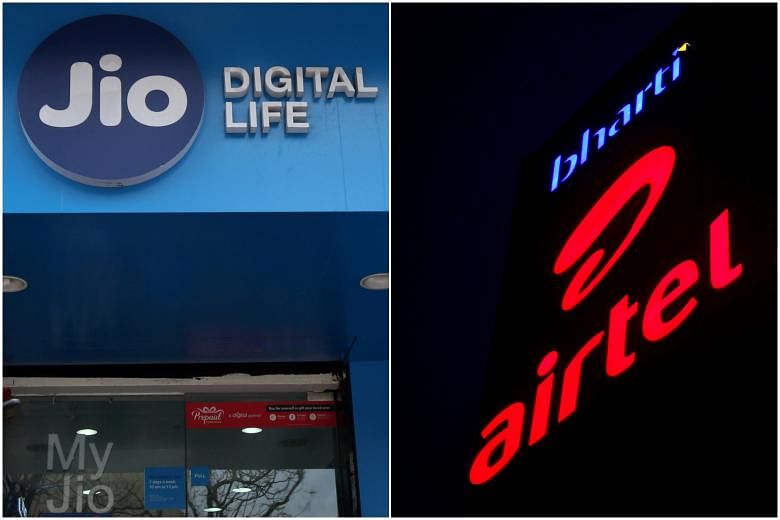MUMBAI (BLOOMBERG) - Months after billionaire Mukesh Ambani's upstart Indian wireless carrier swept into the No 1 spot, a trounced rival is mounting a comeback, and investors are loving it.
Bharti Airtel - an associate of Singapore's Singtel - is the best performer on India's stocks benchmark this year, jumping 26 per cent and reaching a record on May 19, amid optimism the carrier will continue to attract bigger-spending users. The stock surged on Thursday (June 4) in Mumbai after Reuters reported Amazon.com was in early talks to buy a stake of at least US$2 billion (S$2.8 billion).
The comeback is a sharp turnaround for billionaire Sunil Mittal after grueling competition with Ambani's Reliance Jio Infocomm knocked Airtel off its perch in the world's second-biggest wireless market by users. Mittal's company reported a record loss last fiscal year, while a shock court order to pay US$3 billion in back fees forced the operator to raise capital. Another rival - Vodafone Idea - is struggling to survive under a pile of debt.
"The market assumed Bharti Airtel would take months to recover from the onslaught of Reliance Jio," said Arun Kejriwal, director at KRIS, an investment advisory firm in Mumbai. "But they raised funds from the market and have moved quickly to take advantage of the duopolistic nature of Indian telecom landscape."
Jio and former No 1 Airtel have battled over India's telecom market since 2016, when Ambani pushed his way in with a 4G service that offered free calls and cheap data packages. That war of attrition prompted money-losing carriers to exit or merge with others, leaving only three non-state carriers, from about a dozen a few years ago.
Facing a demand from the government for US$4 billion in back fees, one of the survivors, Vodafone Idea, is cutting back coverage to save money and has said it will probably need government help to stay in operation.
Jio, Airtel and Vodafone Idea didn't respond to emailed requests for comment.
With an emerging duopoly, there is more at stake than just gathering hundreds of millions of subscribers and collecting monthly tariffs. Ambani has placed Jio at the center of a digital platform he expects to drive his group's growth into e-commerce, payments and online entertainment.
Airtel has shown it intends to compete for the same turf through its payments, video-on-demand and e-commerce divisions. The talks with US online retail giant Amazon are over a possible 5 per cent stake in Airtel, Reuters said Thursday, citing anonymous sources. A deal will help Amazon access the Indian wireless carrier's 300 million subscribers.
By adding high-value users, Airtel poses a rising challenge to Ambani, who's just off raising more than US$10 billion in weeks from Facebook, General Atlantic, KKR & Co, Silver Lake Partners and Vista Equity Partners. The deals give Jio a formidable profile, valuing its Jio Platforms Ltd. at more than US$65 billion, compared with Airtel's US$40 billion market value.
On Friday, Reliance said Abu Dhabi's Mubadala Investment Co will invest about US$1.2 billion in Jio Platforms, extending Ambani's fund-raising streak.
Airtel is also raising cash to pay down fees related to the court ruling and as it expands 4G coverage across India. Airtel's parent Bharti Telecom last month said it is seeking about US$1 billion by selling a stake in the Indian mobile carrier after its share price hit a record in May. In January, Airtel raised US$3 billion in a sale of shares and bonds to help pay fees.
The share and bond sales drew investors despite Airtel's deteriorating profitability amid a price war.
Gains in Airtel shares helped Mittal add US$1.6 billion to his net worth this year, while Ambani's pile shrank by US$1.1 billion, according to the Bloomberg Billionaires Index.
Airtel reported a record loss in the quarter ended September as it took a one-time charge for the fees while holding tariffs down to stem user defections to Jio. Late last year, Jio announced some fee adjustments that suggested the scathing price war in India's wireless industry was beginning to end.
Revenue at Airtel jumped 15 per cent in the quarter ended March, the biggest jump since 2012, to 237 billion rupees (S$4.39 billion), the highest since Jio introduced commercial services in September 2016.
"The difference between Jio and Airtel is nuanced: while Jio leads in absolute numbers, Airtel is ahead in terms of high-bandwidth and hence high-value customers," said Utkarsh Sinha, managing director at Mumbai-based Bexley Advisors. "There will always be room for two operators."

